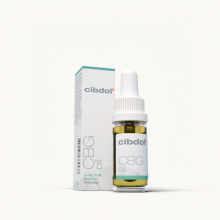Does CBG affect testosterone?
Published:
With growing interest in cannabis-derived health supplements like CBG oil, some men are curious whether CBG may influence testosterone levels.
Contents:
- An Introduction to CBG
- Analyzing the Limited Evidence on CBG and Testosterone
- Currently Unproven Testosterone-Related Claims of CBG
- Potential Risks of CBG for Testosterone Levels
- Considerations for Males Using CBG Products
- Conclusion: CBG’s Effects on Testosterone Are Unclear
- Resources used to write this article
Testosterone is crucial for physical and mental vitality in men. Understanding how emerging compounds like CBG affect testosterone could have important health implications.
But does CBG actually impact testosterone production or levels? Let’s objectively examine the limited research.

An Introduction to CBG
Cannabigerol (CBG) is a non-intoxicating cannabinoid found in low concentrations in hemp and cannabis plants. New production techniques now enable extraction of CBG into oils, capsules, topicals and other supplements.
Early studies suggest potential therapeutic properties of CBG may include:
- Neuroprotective effects
- Reduced inflammation
- Improved digestive function
- Anti-anxiety benefits
- Enhanced sleep quality
- Temporary pain relief
- Muscle relaxation
With this wide range of effects, some are specifically wondering if CBG also influences testosterone levels. But current research provides very little indication either way.
Analyzing the Limited Evidence on CBG and Testosterone
Presently, no studies have directly examined the effects of CBG on testosterone levels in males. However, some preliminary evidence hints at possible influence:
- One rodent study found a CBD and CBG combination increased male sex organ weight, which could theoretically correlate with testosterone. But this was not measured or confirmed.
- CBG may interact with endocannabinoid receptors that play a role in hormonal physiology and reproduction according to limited animal research.
- Anecdotal reports from CBG users are split, with some claiming testosterone-boosting effects but others noting no difference.
So while a plausible theoretical mechanism exists by which CBG could potentially impact testosterone production, there is currently no direct evidence proving that CBG raises or lowers testosterone levels. Claims stating otherwise lack scientific substantiation as of yet.
Currently Unproven Testosterone-Related Claims of CBG
Due to the lack of direct research, claims that CBG provides the following testosterone-related benefits remain wholly unproven:
- Directly raising free or total testosterone levels
- Boosting luteinizing hormone (LH) which stimulates testosterone
- Blocking conversion of testosterone to estrogen
- Improving erectile quality by elevating testosterone
- Increasing muscle mass or strength by raising testosterone
- Enhancing libido or sexual performance via testosterone
Controlled human studies measuring testosterone levels before and after CBG administration would be needed to support such direct claims. While not impossible, current evidence does not confirm these purported testosterone benefits.
Potential Risks of CBG for Testosterone Levels
While CBG is likely safe for most healthy adults at appropriate doses, potential hormonal impacts like testosterone fluctuation come with risks that require caution:
- Unknown long-term effects on testosterone balance and fertility
- Potential over-suppression of testosterone if CBG directly inhibits natural production
- Excess estrogen effects if CBG inhibits testosterone conversion
- Abnormal testicle shrinkage with chronic use if CBG strongly suppresses testosterone
- Accidental ingestion by athletes or children looking to increase testosterone
Until more extensive research is conducted, the hormonal effects of chronic CBG use remain uncertain and warrant careful consideration of potential detrimental impacts.
Considerations for Males Using CBG Products
For men who do choose to use CBG supplements, these tips promote safe and responsible use:
- Avoid using CBG specifically hoping to increase testosterone
- Do not use CBG as testosterone replacement
- Monitor for symptoms like enlarged breasts, shrunken testicles, erectile dysfunction, fatigue, and emotional changes that could signal hormone disruption
- Report any significant hormonal side effects to your doctor promptly
- Use low CBG doses and cycled regimens instead of chronic high doses
- Maintain healthy nutrition, exercise, sleep, and lifestyle habits that support normal testosterone
While CBG shows promise for various wellness applications, hormonal impacts remain uncharted territory requiring much more research before endorsements for use.
Conclusion: CBG’s Effects on Testosterone Are Unclear
Claims that CBG supplements like CBG oil directly modulate testosterone levels or provide targeted anabolic or male enhancement effects are completely unsubstantiated currently. No studies exist demonstrating CBG raises or lowers testosterone.
However, it’s possible CBG could affect testosterone production or metabolism indirectly through its influence on the endocannabinoid system. But this remains theoretical. Well-designed human studies are needed to characterize CBG’s hormonal impact.
For now, men should avoid using CBG with the sole goal of altering testosterone, as safety and long-term effects are unknown. Instead, focus on evidence-backed lifestyle strategies for optimizing testosterone through diet, exercise, stress reduction and sleep. Look to CBG for general wellness rather than hormonal enhancement specifically.
As with any new supplement, caution is advised until high quality clinical data elucidates the true biological effects. Further CBG research could uncover hormonal impacts, but for now such effects are hypothetical and require safer assumptions.
Resources used to write this article
- Gür, S., Kücükler, S.K. How Does Cannabis Affect Male Sexual Health?. Sex Med Rev 9, 264–275 (2021). https://doi.org/10.1016/j.sxmr.2020.11.005
- Borrelli, F., Pagano, E., Romano, B., Panzera, S., Maiello, F., Coppola, D., De Petrocellis, L., Buono, L., Orlando, P., & Izzo, A. A. (2014). Colon carcinogenesis is inhibited by the TRPM8 antagonist cannabigerol, a Cannabis-derived non-psychotropic cannabinoid. Carcinogenesis, 35(12), 2787-2797. https://doi.org/10.1093/carcin/bgu205
- Bruni, N., Della Pepa, C., Oliaro-Bosso, S., Pessione, E., Gastaldi, D., & Dosio, F. (2018). Cannabinoid Delivery Systems for Pain and Inflammation Treatment. Molecules (Basel, Switzerland), 23(10), 2478. https://doi.org/10.3390/molecules23102478
- Trost, L.W. & Mulhall, J.P. (2021). Cannabis and Male Fertility: A Systematic Review. Sexual Medicine Reviews, 10(1), 184-194. https://doi.org/10.1016/j.sxmr.2020.12.009
- Ghanemi, A., He, Y. J., & Yee, D. J. (2019). Cannabinoid Type 1 Receptor Antagonist AM251 Increases Serum Testosterone Levels in Adult Rats. Systems biology in reproductive medicine, 65(3), 193–203. https://doi.org/10.1080/19396368.2019.1590482










